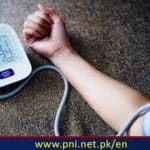ISLAMABAD, APRIL 02 (ONLINE): Researchers report that silent brain infarction (SBI) and cerebral small vessel disease (CSVD) are more common among people with heart conditions.
CSVD is the second leading cause of vascular dementia after Alzheimer’s disease.
Expert say routine brain imaging of people with heart conditions could lead to early detection of health issues.
Subtle changes to blood vessels in the brain, common among people with certain heart conditions, can increase the risk of stroke and dementia, a new study reports.
The review of more than 220 previously published studies found that changes to blood vessels known as silent brain infarction (SBI) and cerebral small vessel diseaseTrusted Source (CSVD) — both detectable only via brain imaging — are more common among people with atrial fibrillation, coronary artery disease, heart failure or cardiomyopathy, heart valve disease, and patent foramen ovale (a hole in the heart).
“When the tiny blood vessels in your brain become narrow and blocked, it can prevent blood from reaching certain areas of your brain,” Dr. Michael Ross MacDonald, a cardiologist at The Harley Street Heart and Vascular Centre in Singapore, told Medical News Today.
“Over time, this damage can accumulate and result in symptoms of vascular cognitive impairment, eventually progressing to vascular dementia,” said MacDonald, who was not involved in the study.
Heart conditions and brain changes
The meta-analysis, published in the journal Neurology, concluded that SBI was detectable in about one in three people with heart disease.
Two-thirds of the people studied had white matter lesions (damage to the protective coating around nerve fibers), a quarter had evidence of asymptomatic microbleeds in the brain, and more than half had brain atrophy, defined as a shrinkage due to loss of neurons or connections between neurons.
“Generally speaking, what is bad for the heart is bad for the brain, so various cardiac conditions [like SBI and CSVD] contributing to cerebrovascular injury… makes complete sense,” said Dr. Gregory Bix, the director of Tulane University’s Clinical Neuroscience Research Center and vice chair of Neurosurgery and Neurology at the Tulane School of Medicine in New Orleans.
“SBI and CSVD are overlooked cardiovascular health conditions, to some degree, as they are chronic conditions with insidious onset of cognitive symptoms that are often missed in early stages,” Bix, who was not involved in the study, told Medical News Today. “However, CSVD is a major cause of vascular dementia, the second leading cause of dementia behind Alzheimer’s disease.”
Heart disease and the brain’s vascular system
The prevalence of these changes in the brain’s vascular system, which usually don’t cause obvious neurological symptoms, was elevated regardless of whether the people studied had previously had a stroke, researchers reported.
“Although people with heart disease are two to three times more likely than the general population to have changes in their brain’s vascular system, they’re often overlooked, because these patients don’t routinely undergo brain imaging unless they have suffered a stroke,” said Dr. Zien Zhou, the lead study author and a cardiovascular and neurological researcher at The George Institute for Global Health in Sydney, Australia, in a press statement. “But it can make them more susceptible to the risk of brain bleeds from medications commonly used to treat or prevent blood clots — intracranial hemorrhage is a life-threatening complication with no proven treatment and a survival rate of less than 50 percent.”
Zhou said that aging, hypertension, type 2 diabetes, high cholesterol, and smoking are among the likely causes of these “hidden” changes to blood vessels in the brain.
“It’s possible that a gradual decline in cardiac output in some patients with heart disease might affect how much blood is reaching the brain tissue, contributing to vascular changes and cognitive dysfunction in these patients,” he said. “It’s also possible that hidden brain changes and cognitive dysfunction are a consequence of tiny blood clots traveling to the brain through the arterial circulation after forming in the heart.”
Zhou said that further study is needed to determine whether routine brain imaging for patients undergoing anticoagulation therapy (which includes most people with heart disease) could reduce risks such as bleeding in the brain.
“These findings suggest that all individuals with atrial defibrillation, coronary artery disease, heart failure or cardiomyopathy, and heart valve disease should have brain scanning,” said Bix.
“This study shows a clear correlation between heart disease and SBI and CSVD,” he added. “However, whether one causes the other remains to be determined.”
Follow the PNI Facebook page for the latest news and updates.








